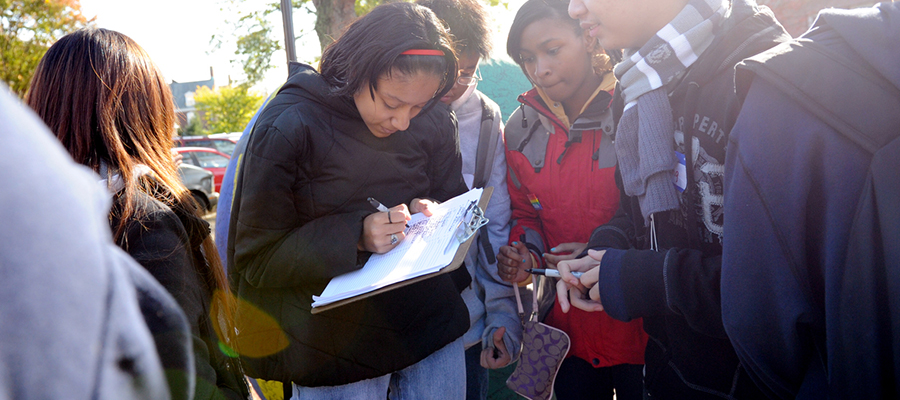Youth Activism and Community Change

Running for Office
Protest + Politics
Women Lead
Online to Offline
Overview
Young people bring many assets to community-building work, which too often are not valued or leveraged. Communities should have varied avenues for a wide diversity of young people’s voices to be heard and for youth to contribute to a thriving community. Young people pursue and create change when they participate in school civics projects that involve addressing local problems, when they work with others in their neighborhood, when they work as part of organizations that enhance youth voices in communities, and in myriad other ways.
Activism, community organizing, and participation in social movements are powerful forms of civic engagement. Throughout American history, these avenues for change have often been led and fueled by young people. Youth activism has an extraordinary potential to transform communities, and it carries important benefits to those who participate—especially for low-income youth, youth of color, and other young people who have been historically marginalized from civic life.
Community-based organizations often drive this work, along with young leaders themselves, but sustainable youth engagement can come when communities create more support for youth voices to ensure that community-decision-making is informed by a wide range of youth—especially those directly impacted by community change.
Building Political Homes for Youth
25 Things We Learned about Young Voters in 2025
“Ripe For Organizing”: Youth Civic Engagement Lessons from Alabama
Themes and Areas of Research
In recent years, young people have increasingly engaged in activism, whether participating in protests or actively supporting candidates for public office. Our 2018 youth survey found that the rates of various types of youth activism went up between 2016 and 2018, and that Democrats are more likely to participate.
Read more about:
Young people who engage in activism and service experience personal growth, expand their networks, often receive mentoring, and can enjoy opportunities to expand their impact by participating in broader political and community leadership. Activism and other forms of civic participation can also be a pathway to redressing inequity and advancing economic mobility. There are clear and compelling links between core civic participation and leadership skills and competencies and skills that are valued in the workplace. Young people who engage in this type of work must be able to find opportunities to move up within and outside of the organizing sector.
These connections are especially important for young people from historically marginalized or underrepresented communities, who may have been denied these developmental opportunities but who can find in activism and community work a chance to acquire valuable skills and networks.
Read more about:
The civics classroom—and civic learning education more broadly—can be an important way that young people not just learn how to effect change in their communities and on the issues they care about, but actually do it. Approaches like service learning and action civics that center young people's voices and concerns, have them work on issues they care about, and provide opportunities for reflection as part of broader learning and development, are especially promising. Much of our research on civic education focuses on these connections between learning and action, highlighting best practices for this type of civic learning and its potential to serve as the foundation for youth becoming civic actors and agents of change.
Read more about:


